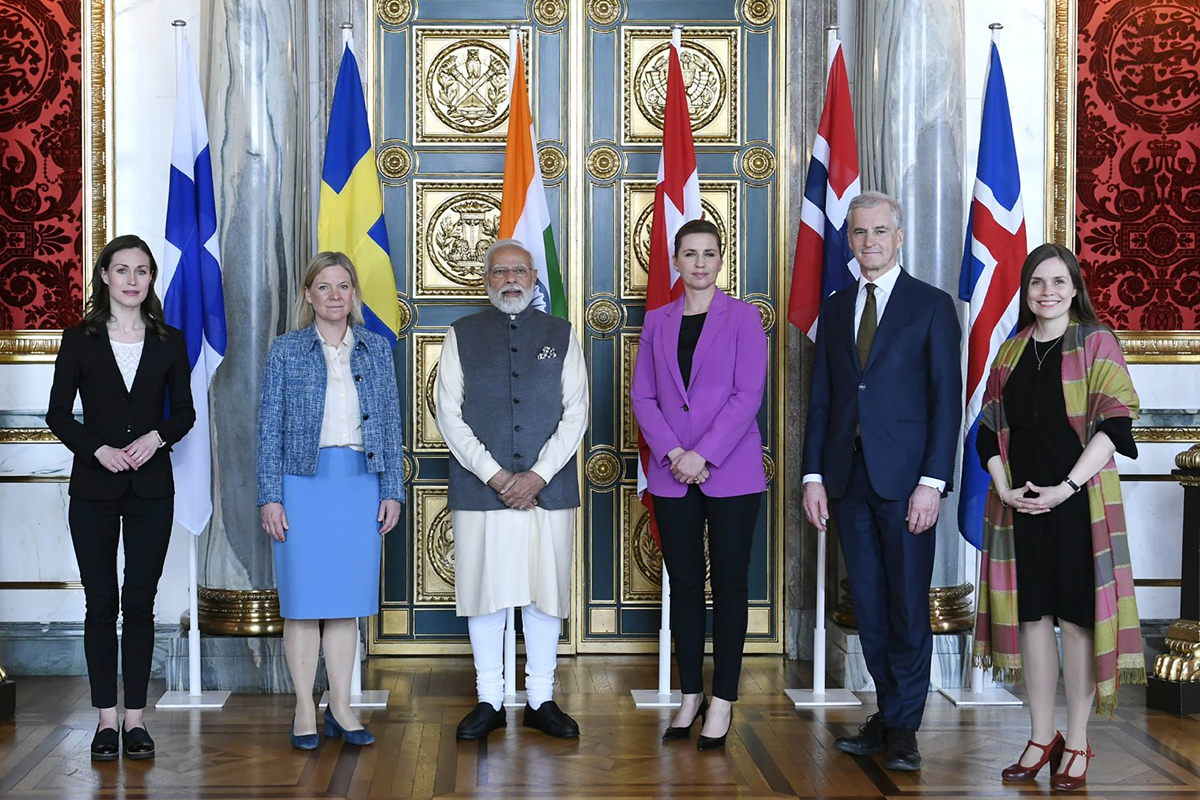
COPENHAGEN, May 4: Prime Minister Narendra Modi on Wednesday said the India-Nordic Summit will go a long way in boosting India’s ties with the resource-rich region and emphasised that his productive bilateral meetings with his counterparts from Denmark, Norway, Sweden, Iceland and Finland has underlined that together they can achieve and contribute to global prosperity and sustainable development.
Modi, who arrived here on Tuesday from Berlin on the second leg of his visit to three European nations, met the four Nordic leaders on the sidelines of the second India-Nordic Summit here.
“The India-Nordic Summit will go a long way in boosting India’s ties with the region. Together, there is much that our nations can achieve and contribute to global prosperity and sustainable development,” Modi tweeted at the end of the Summit.
“The India-Nordic Summit gave a great platform to discuss ways to boost ties with the Nordic nations. The bilateral meetings with Nordic leaders were also productive. I look forward to working with them in various sectors aimed at furthering prosperity,” he wrote.
Modi on Tuesday held extensive discussions with Danish counterpart Mette Frederiksen on the full range of bilateral cooperation as well as matters of regional and global interests.
On Wednesday, he met Norwegian counterpart Jonas Gahr Store and the two leaders took stock of the full range of bilateral relations.
“Had a productive meeting with PM @jonasgahrstore of Norway. Our talks included furthering cooperation in sectors such as the blue economy, clean energy, space, healthcare and more. Norway is a key pillar of India’s recently announced Arctic Policy,” Modi tweeted.
Discussions also took place on regional and global developments. As members of the UN Security Council, India and Norway have been engaging with each other in the UN on global issues of mutual interest, the Ministry of External Affairs (MEA) said.
Modi’s visit comes amid the Ukraine crisis, which has united much of Europe against Russia.
“Both leaders discussed the potential for deepening engagement in areas like Blue Economy, renewable energy, green hydrogen, solar and wind projects, green shipping, fisheries, water management, rainwater harvesting, space cooperation, long term Infrastructure investment, health and culture,” the MEA said.
Modi also had a “wonderful meeting” with Swedish counterpart Magdalena Andersson during which they discussed ways to deepen bilateral ties and the progress in the Joint Action Plan.
“We discussed ways to deepen bilateral cooperation in key sectors like security, IT, research and innovation. Strong ties between our nations will benefit our people,” Modi tweeted.
During the meeting, the two leaders took stock of the progress in the Joint Action Plan and also appreciated the expanding scope of the jointly launched LeadIT initiative, MEA spokesperson Arindam Bagchi said.
During the 2018 visit of Prime Minister Modi to Sweden, the two sides adopted a wide-ranging Joint Action Plan to take forward a wide range of initiatives in defence, trade and investment, renewable energy, smart cities, women’s skill development, space and science and healthcare etc.
“Discussions also took place on regional and global developments,” the MEA said, adding that the two leaders expressed satisfaction at the progress made by the Lead IT initiative.
This was a India-Sweden joint global initiative to set up a Leadership Group on Industry Transition (LeadIT) in September 2019 at the UN Climate Action Summit to help guide the world’s heaviest greenhouse gas emitting industries towards the low-carbon economy. Its membership has now grown to 35 with 16 countries and 19 companies.
“Both leaders also discussed possibilities of deepening cooperation in areas like innovation, climate technology, climate action, green hydrogen, space, defence, civil aviation, Arctic, polar research, sustainable mining and trade and economic ties,” it added.
Modi also held talks with Iceland Prime Minister Katrin Jakobsdottir and discussed ways to further strengthen economic cooperation especially in the sectors of geothermal energy, Blue Economy, Arctic, renewable energy, fisheries, food processing, education including digital universities, and culture, the MEA said. (PTI)

